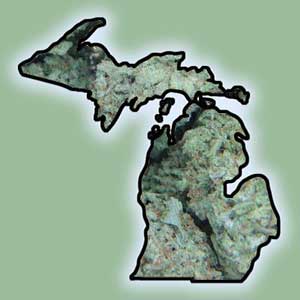 The annual report on Michigan’s Medical Marihuana Program (MMP) for fiscal year 2013 revealed a new record for registration fees collected: $10,897, 580.61. This represents a $1 million increase from the revenue generated in FY 2012, which was $9,896,239.
The annual report on Michigan’s Medical Marihuana Program (MMP) for fiscal year 2013 revealed a new record for registration fees collected: $10,897, 580.61. This represents a $1 million increase from the revenue generated in FY 2012, which was $9,896,239.
The annual report, which is required by law to be complete and distributed to certain governmental agencies by January 1, was compiled by the Bureau of Licensing and Regulatory Affairs (LARA). The MMP only accepts fees in $100 and $25 increments, inspiring conjecture as to the origination of the 61 cents in a statistic that is exclusively composed of “medical marihuana program application and renewal fees authorized in section 5 of the Michigan medical marihuana act.”
READ THE REPORT: Fiscal Year 2013 MM statistics
The report lists 63,628 renewal applications and 70,262 new applications for medical marijuana registry identification cards received during FY 2013. Those numbers include both patient applications and caregiver applications and they total 133,890; in a companion report, issued December 4, the actual number of patients and caregivers registered in Michigan is 145,414.
These numbers represent a decline in registrations for both patients and caregivers from FY 2012. During that fiscal year 124,131 patients were registered with the state; the current report lists 118,368, representing a 4.6% reduction. Caregiver numbers declined far more sharply, dropping from 50,188 in FY 2012 to 27,046; that reflects a whopping 46% drop in registrants licensed to grow medicinal marijuana for someone other than themselves.
The number of physicians writing recommendations for medical marijuana use in Michigan has dwindled from 1,928 in FY 2012 to 1,457 in the latest report, a 24% drop.
The number of participants statewide could increase in FY 2014 but the MMP revenue will not increase. A law, passed by the legislature in 2012 and signed by Governor Snyder in 2013, made each application received after April 1 valid for a two year period. This will essentially halve that $10.9 million annual revenue and should result in a corresponding decrease in the expense of operating the MMP, which is listed at slightly over $4 million.
Although the MMP has been up and running for nearly five years, efficiency in the operation of the program is still sketchy. 19.9% of renewal applications and 21.5% of initial applications were not processed within the 15 day period required by law. The issuance of medical marijuana cards, which has been a huge stumbling block for the MMP, is reported to be far more efficient: only 8% of renewal and 5.6% of new cards were not issued within appropriate time periods.
The report has changed format from that used in previous years. The MMP is no longer reporting the number of minors licensed to use medical marijuana and the statistical reporting on the medical conditions of registered patients has been altered to reflect percentages of registrants instead of actual numerical data. The new report was created by Bureau of Health Care Services Director Carole H. Engle under the direction of Steve Arwood, Director of LARA.
Arwood is famous for his 2013 decision rescinding the discounted registration fee for disabled individuals that had been a part of the program for four years. Standard registration fees are $100; the discounted registration fee of $25 is available to those that qualify as a financial hardship. National marijuana rights organization Americans for Safe Access issued a letter to Arwood and Governor Rick Snyder in opposition to this move, which was supported by numerous organizations in Michigan and nationwide.
Source: TheCompassionChronicles.Com

























